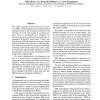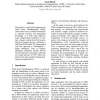42 search results - page 4 / 9 » Word-Sense Disambiguation Using Decomposable Models |
134
Voted
COLING
2002
15 years 2 months ago
2002
In this paper, a supervised learning system of word sense disambiguation is presented. It is based on conditional maximum entropy models. This system acquires the linguistic knowl...
124
Voted
EMNLP
2004
15 years 4 months ago
2004
This paper presents Domain Relevance Estimation (DRE), a fully unsupervised text categorization technique based on the statistical estimation of the relevance of a text with respe...
170
Voted
AAAI
2011
14 years 2 months ago
2011
Effective access to knowledge within large declarative memory stores is one challenge in the development and understanding of long-living, generally intelligent agents. We focus o...
103
Voted
CORR
2000
Springer
15 years 2 months ago
2000
Springer
This paper revisits the one sense per collocation hypothesis using fine-grained sense distinctions and two different corpora. We show that the hypothesis is weaker for fine-graine...
118
Voted
ACL
2006
15 years 4 months ago
2006
We present a novel hybrid approach for Word Sense Disambiguation (WSD) which makes use of a relational formalism to represent instances and background knowledge. It is built using...



